Table of Contents
Get started with MyPerfectResume today!
- Build a resume on any device
- Pick an ATS-friendly template
- Tailor with AI copy suggestions
Why this resume works
- Quantifies accomplishments: Increasing team win rates by 30% and improving player skills by 25% powerfully illustrates the applicant’s achievements and impact.
- Uses action-oriented language: Action verbs like “developed” and “organized” communicate initiative and effectiveness.
- Highlights industry-specific skills: Skills such as tennis strategy development and tournament organization emphasize their fit for sports roles, leveraging industry-specific expertise to demonstrate a strong sector alignment.
More Tennis Coach Resume Examples
Our tennis coach resume examples provide insights into showcasing your coaching strategies, player development skills, and match preparation experience. Use these sports resume samples to build a strong resume that reflects your passion for tennis coaching.
Entry-Level Tennis Coach
Why this resume works
- Centers on academic background: Listing a master’s in sports management, the applicant’s education section paints a picture of dedication and excellence, which is particularly strong early in their career.
- Effective use of keywords: By weaving in role-specific keywords like “team leadership” and “strategic planning,” the applicant ensures their resume stands out to applicant tracking systems (ATS).
- Puts skills at the forefront: The skills-based resume format prioritizes essential skills like player development and tournament organization, immediately showcasing capabilities for entry-level positions.
Mid-Level Tennis Coach
Why this resume works
- Points to measurable outcomes: By achieving a 35% improvement in player skills and increasing memberships by 25%, the applicant quantifies their impact, proving effectiveness in player development and program success.
- Demonstrates language abilities: Language skills in Spanish, French, and Italian improve cross-cultural communication, supporting the applicant’s ability to engage diverse groups.
- Displays technical expertise: Holding certifications like Certified Tennis Coach demonstrates solid technical expertise essential for delivering high-quality coaching and training programs at various prestigious sports institutions.
Experienced Tennis Coach
Why this resume works
- Focuses on work history: Using a chronological resume, the applicant clearly maps out their extensive career, starting as a junior coach progressing to leadership roles over 15 years.
- Showcases impressive accomplishments: With standout achievements like elevating student rankings by 30% and generating $10,000 through charity events, the applicant’s accomplishments reveal significant impact in sports coaching.
- Emphasizes leadership skills: Through managing team budgets and hosting workshops, the applicant showcases leadership skills that drive both financial savings and skill improvement.
Tennis Coach Resume Template (Text Version)
Jane Johnson
Portland, ME 04103
(555)555-5555
Jane.Johnson@example.com
Professional Summary
Experienced Tennis Coach with proven track record in team leadership and strategy development. Skilled in training program design, boosting team performance by 30%, and organizing major sports events.
Work History
Tennis Coach
Elite Tennis Academy – Portland, ME
July 2022 – August 2025
- Increased team win rate by 30%
- Developed training programs for 50+ students
- Organized 10+ community tennis events
Assistant Coach
ProCourt Sports Club – Portland, ME
July 2019 – June 2022
- Enhanced player skills by 25%
- Assisted in planning 12+ tournaments yearly
- Coached junior team to regional finals
Tennis Instructor
Ace Tennis Camp – Portland, ME
April 2017 – June 2019
- Led 20+ instructional clinics weekly
- Achieved 90% client satisfaction rate
- Introduced new training methods
Languages
- Spanish – Beginner (A1)
- French – Intermediate (B1)
- Italian – Beginner (A1)
Skills
- Tennis strategy development
- Player coaching and mentoring
- Team leadership
- Sports event planning
- Fitness training
- Performance analysis
- Youth training programs
- Tournament organization
Certifications
- Certified Professional Coach – US Tennis Association
- Sports Nutrition Specialist – International Sports Sciences Association
Education
Master of Science Sports Management
University of Illinois Champaign, Illinois
June 2016
Bachelor of Arts Physical Education
University of Illinois Chicago, Illinois
June 2014
Related Resume Guides
Advice for Writing Your Tennis Coach Resume
Dive into our tailored tips on how to write a resume for tennis coaches and discover how to highlight your unique game plan that sets you apart from the competition.
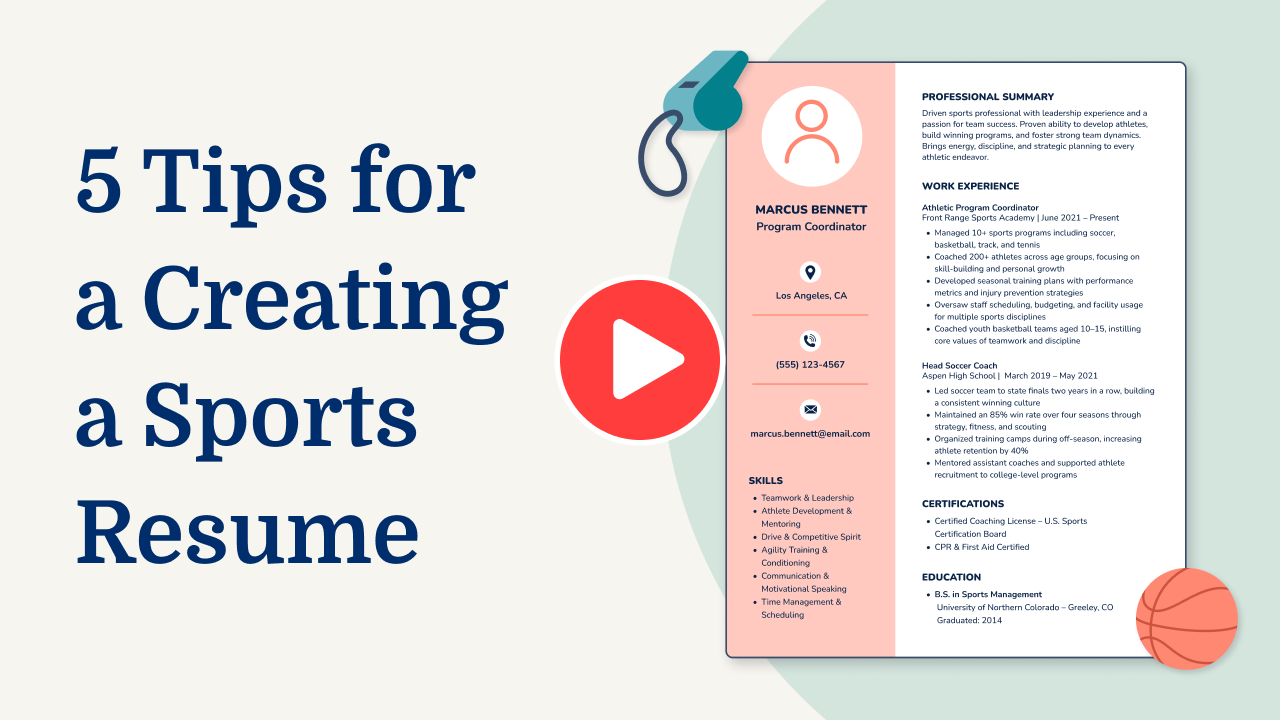
Write a strong professional summary
A professional summary on a resume serves as an introduction to hiring managers, helping them quickly understand who you are and what you bring to the table.
This brief section, typically three to four sentences long, highlights your experience, skills, and achievements. A professional summary is best for experienced applicants because it showcases your professional identity and the value you can offer. It helps readers immediately see why you are a strong fit for the job.
In contrast, resume objectives focus on your career goals and what you aim to contribute to the company. They are more suitable for entry-level job seekers, career changers, or those with employment gaps. Think of it as “what I’ve accomplished” versus “what I aim to contribute.”
Next, we will provide examples of both professional summaries and resume objectives tailored for various industries and experience levels.
Tennis coach resume summary examples
Entry-level
Recent graduate with a Bachelor of Science in sports management and certified tennis instructor through the USPTA. Experienced in organizing youth clinics and assisting senior coaches with basic skills training. Passionate about developing players’ techniques and fostering a love for the sport in beginners.
Mid-career
Skilled tennis coach with over seven years of experience working with competitive junior players at regional clubs. Expert in designing personalized training programs that improve performance and increase rankings. Known for strong mentorship abilities, having guided multiple athletes to state championships, while maintaining a fun and motivating environment.
Experienced
Veteran tennis coach with 15+ years of experience leading high-performance teams and managing comprehensive coaching programs. Specialized in advanced player development, including mental toughness training and strategic gameplay analysis. Successfully coached numerous athletes to national titles, emphasizing teamwork and resilience as core elements of success.
Tennis coach resume objective examples
Entry-level
Aspiring tennis coach with a background in sports management and hands-on experience in youth coaching. Eager to bring enthusiasm and teaching skills to a community tennis program, fostering growth and development in players while promoting a positive team environment.
Career changer
Driven professional transitioning from corporate sales to tennis coaching, bringing strong communication and organizational skills. Seeking an opportunity to inspire players and contribute to their skill development in a nurturing setting through innovative coaching techniques.
Recent graduate
Recent kinesiology graduate aiming to start a career as a tennis coach. Passionate about applying sports science knowledge and training principles to help athletes reach their full potential, while encouraging healthy competition and teamwork.
Try the Resume Builder to make your tennis coach resume stand out. It offers easy templates so you can focus more on sharing your skills and experience.
Include relevant certifications and training
Listing certifications and training as a tennis coach shows that you have the skills to teach and improve players’ games. It also helps parents, clubs, or schools trust that you know what you’re doing. With the right credentials, you stand out from other coaches who may not be as qualified.
- Professional Tennis Registry (PTR) Certification
- United States Professional Tennis Association (USPTA) Certification
- Cardio Tennis Instructor Training
- SafeSport Certification
- First Aid and CPR Training
Having these certifications means you are ready to offer high-quality coaching and handle any situation on the court. They show your commitment to being a knowledgeable and prepared tennis coach. This can help you get more job opportunities and improve your coaching career.
Example of a certifications section
Certified Tennis Professional (CTP)
Issued by: United States Professional Tennis Association (USPTA)
Issued 2022
Professional Tennis Registry (PTR) Certification
Issued by: Professional Tennis Registry (PTR)
Expires 2026
Cardio Tennis Instructor Certification
Issued by: Tennis Industry Association (TIA)
Issued 2021
High Performance Coach Certification
Issued by: International Tennis Federation (ITF)
Issued 2020
Select a polished resume template with consistent margins, fonts, and section headings. Avoid flashy designs and over complicated layouts.
Showcase your work experience
Your work experience helps employers understand the skills and achievements you bring to the table. Begin with your most recent job and work backward in time, detailing each role with the job title, employer’s name, location, and employment dates.
This reverse chronological order allows hiring managers to easily follow your career path. Use clear, action-oriented language to describe your responsibilities in each job. Instead of merely stating “coached players,” consider saying “developed personalized training plans that improved player performance by 20%.”
When describing your roles, emphasize measurable results to illustrate your effectiveness as a tennis coach. For instance, if you helped your team win a championship or increased attendance at coaching sessions, be sure to mention these achievements.
Include essential duties like organizing practice sessions, teaching techniques, analyzing player performance, and mentoring players on sportsmanship and strategy. These details not only highlight your abilities but also show how you’ve made positive contributions in past positions.
Keep in mind that potential employers seek specific skills that align with their needs. By clearly presenting your work history with compelling examples of success as a tennis coach, you will stand out as an experienced applicant capable of making a meaningful impact on their team.
5 tennis coach work history bullet points
- Developed personalized training programs for over 50 athletes, resulting in a 20% improvement in their performance metrics.
- Coached a high school tennis team to win their regional championship, achieving the first title for the school in 10 years.
- Implemented video analysis sessions, leading to a 15% increase in players’ match-winning strategies and techniques.
- Organized weekly tennis clinics attracting more than 100 participants, improving community engagement and increasing club membership by 30%.
- Mentored junior coaches, improving coaching staff retention rates by 40% through effective leadership and support.
Select a resume format that highlights your coaching experience, certifications, and skills in developing players for tennis coaches.
Match your resume with the job description
Tailoring resumes to job descriptions is important for job seekers, especially when applying for positions like a tennis coach. This approach helps you stand out to employers and ensures your resume passes through ATS. These systems scan resumes for specific keywords and phrases from job postings, making it essential to align your resume with the role.
An ATS-friendly resume includes terms that match the skills needed for the job. By incorporating keywords and phrases that highlight your abilities, you increase your chances of being noticed by hiring managers. This strategy ensures your resume gets through the initial screening process.
To find these keywords, carefully read the job posting. Look for skills, qualifications, and tasks mentioned repeatedly. For example, if a tennis coach role emphasizes “player development,” “coaching techniques,” or “tournament preparation,” use these exact phrases in your resume.
Incorporate these terms naturally into your content. For instance, instead of saying “Coached tennis players,” you might write “Focused on player development and tournament preparation.” This shows how well you fit the role while keeping the language natural.
By creating targeted resumes and taking steps to customize your resume, you improve their compatibility with ATS systems. This increases your likelihood of advancing in the hiring process and landing interviews for jobs like a tennis coach.
Try the ATS Resume Checker to find over 30 common mistakes in your resume’s layout and wording. You’ll get quick tips on boosting your resume score!
FAQ
Do I need to include a cover letter with my tennis coach resume?
Including a well-crafted cover letter with your tennis coach resume can make you stand out to potential employers.
A cover letter gives you the chance to highlight your coaching philosophy, specific achievements, and how you can contribute to the team’s success.
For example, if the club focuses on competitive training or has a strong junior development program, you can elaborate on your relevant experience in those areas.
Consider using a Cover Letter Generator to create a personalized cover letter that complements your resume and showcases your strengths as a tennis coach.
Additionally, reviewing some cover letter examples tailored for sports coaching roles can offer inspiration and ensure your application is polished and professional.
How long should a tennis coach’s resume be?
For a tennis coach, a one-page resume is often sufficient to highlight your coaching skills, achievements, and relevant certifications. This format ensures you present the most important information succinctly.
However, if you have extensive coaching experience or additional qualifications like specialized training programs or notable tennis achievements, a two-page resume may be more suitable. Just ensure every detail directly relates to your coaching abilities and accomplishments.
To gain insights on how long a resume should be for different professions and career stages, consider exploring guides focused on this topic.
How do you write a tennis coach resume with no experience?
Creating a resume with no experience for a tennis coach involves highlighting your skills, education, and any relevant activities that demonstrate your potential as a coach. Here are some steps to build an impressive resume:
- Highlight your education: If you have completed courses related to sports management or physical education, list them first. Mention any training or certifications in tennis coaching that you’ve pursued.
- Showcase transferable skills: Even if you haven’t coached before, skills like communication, leadership, and teamwork gained from other experiences can be valuable. Highlight these prominently on your resume.
- Include volunteer or informal coaching: If you’ve ever volunteered at summer camps or helped organize tennis clinics informally, list these experiences to show practical involvement in the sport.
- Focus on passion for tennis: Demonstrate your commitment by mentioning personal achievements in tennis, such as participation in tournaments or clubs.
Rate this article
Tennis Coach
Share this page
Additional Resources
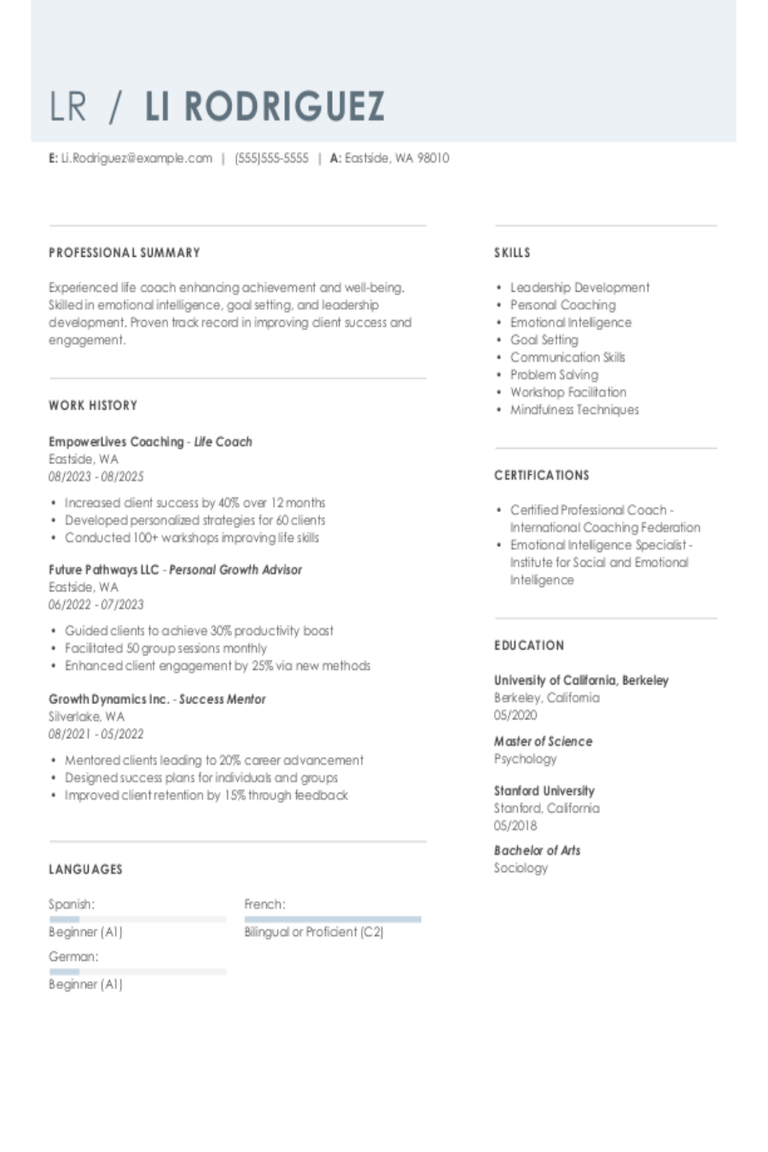
Life Coach Resume Examples & Templates
Discover life coach resume examples and tips that will help you create a resume that highlights your coaching skills and experience effectively.Build my resumeImport existing resumeCustomize this templateWhy this resume
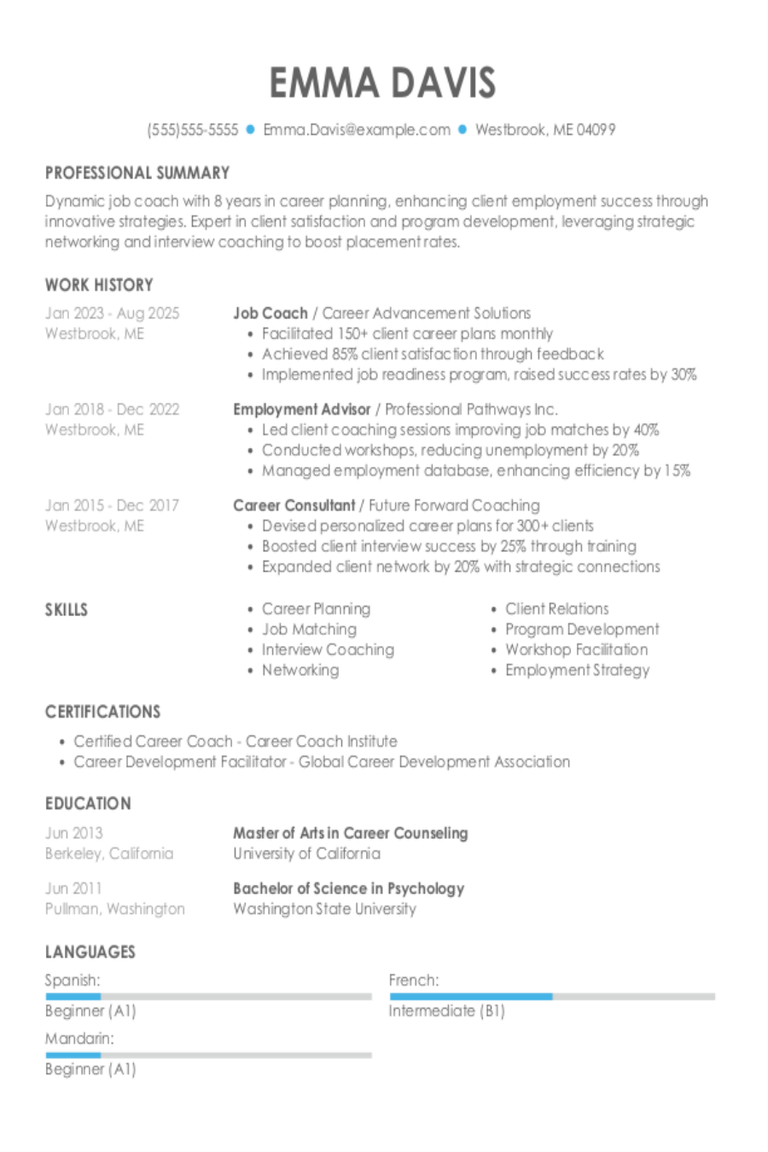
Job Coach Resume Examples & Templates
Browse job coach resume examples and learn how to highlight your coaching skills, experience with job placements, and success in helping clients achieve their goals.Build my resumeImport existing resumeCustomize this
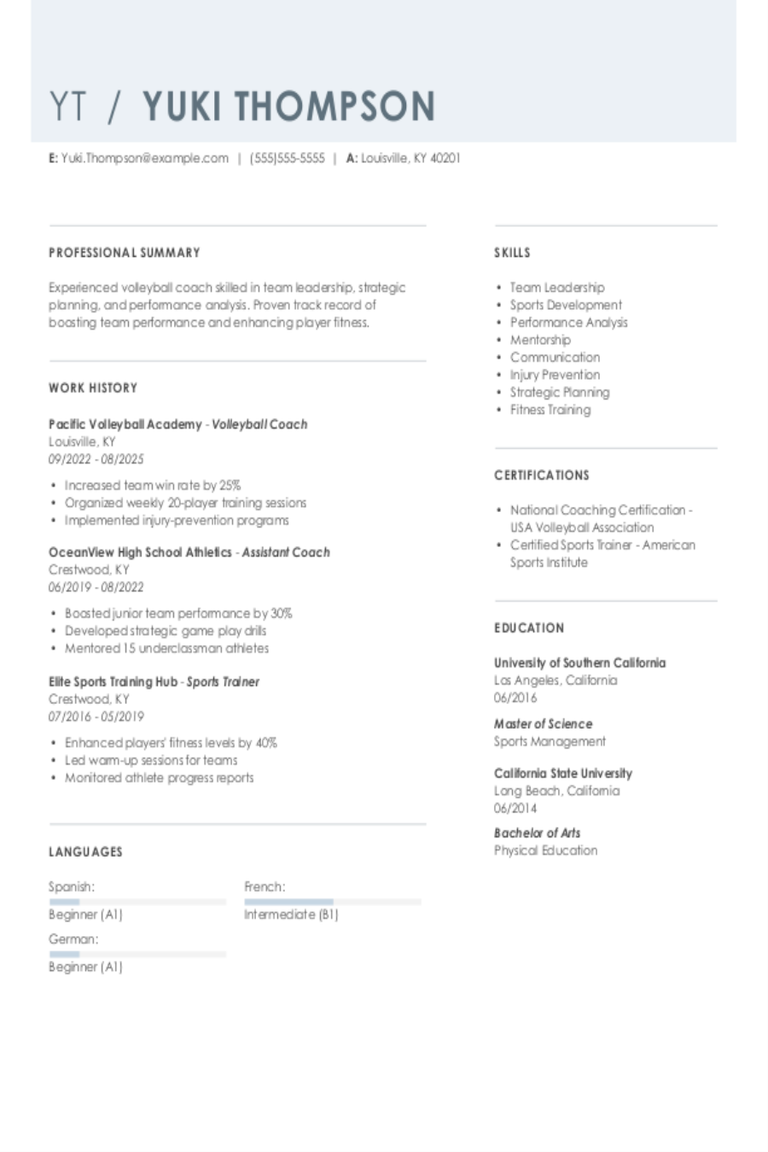
Volleyball Coach Resume Examples & Templates
Browse volleyball coach resume examples and tips to learn how to highlight your coaching skills, team leadership, and game strategy experience in a way that stands out.Build my resumeImport existing
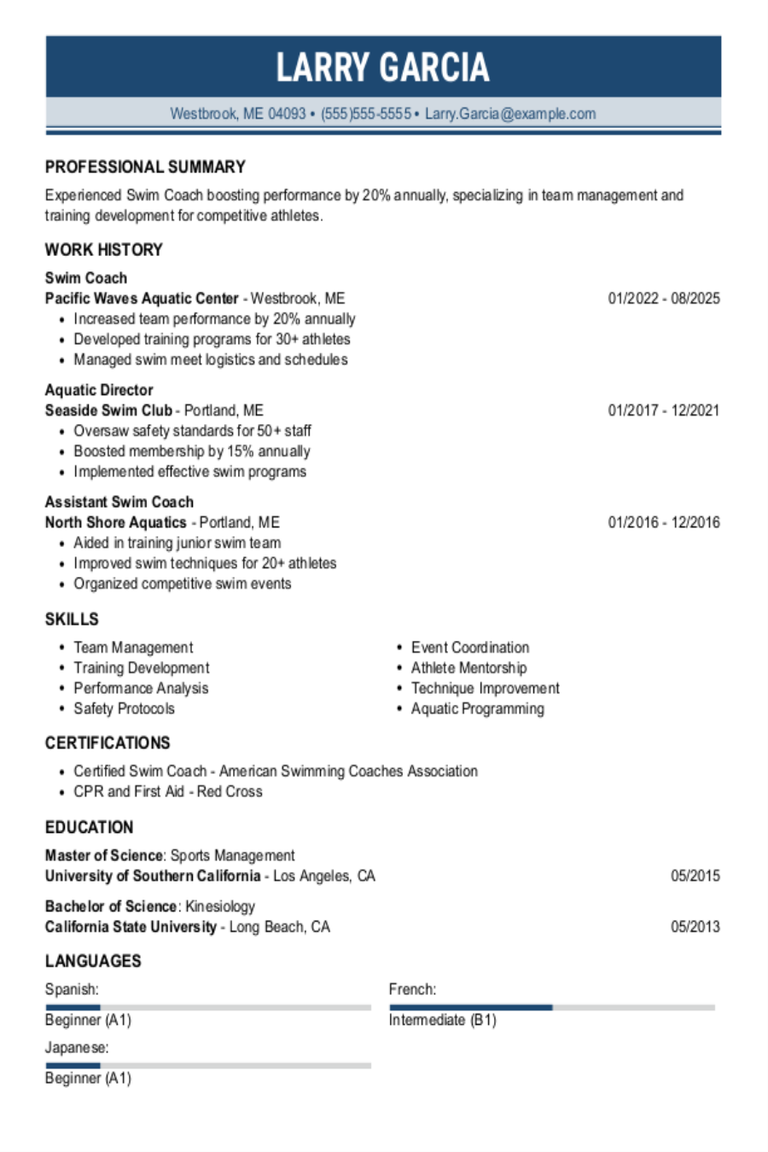
Swim Coach Resume Examples & Templates
Find swim coach resume examples that show how to highlight your training skills and experience with swimmers. Learn tips to showcase your ability to plan workouts, motivate athletes, and improve
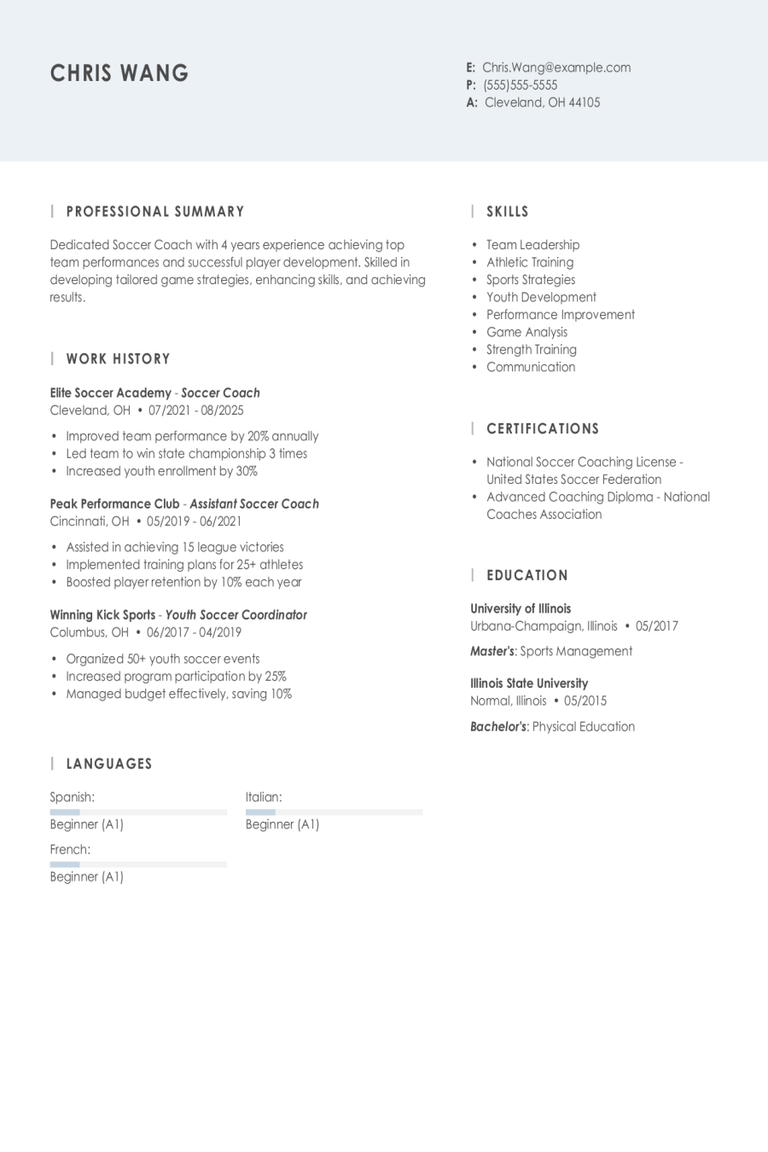
Soccer Coach Resume Examples & Templates
Explore soccer coach resume examples and learn how to highlight coaching skills and relevant experience in a simple and clear way.Build my resumeImport existing resumeCustomize this templateWhy this resume worksQuantifies
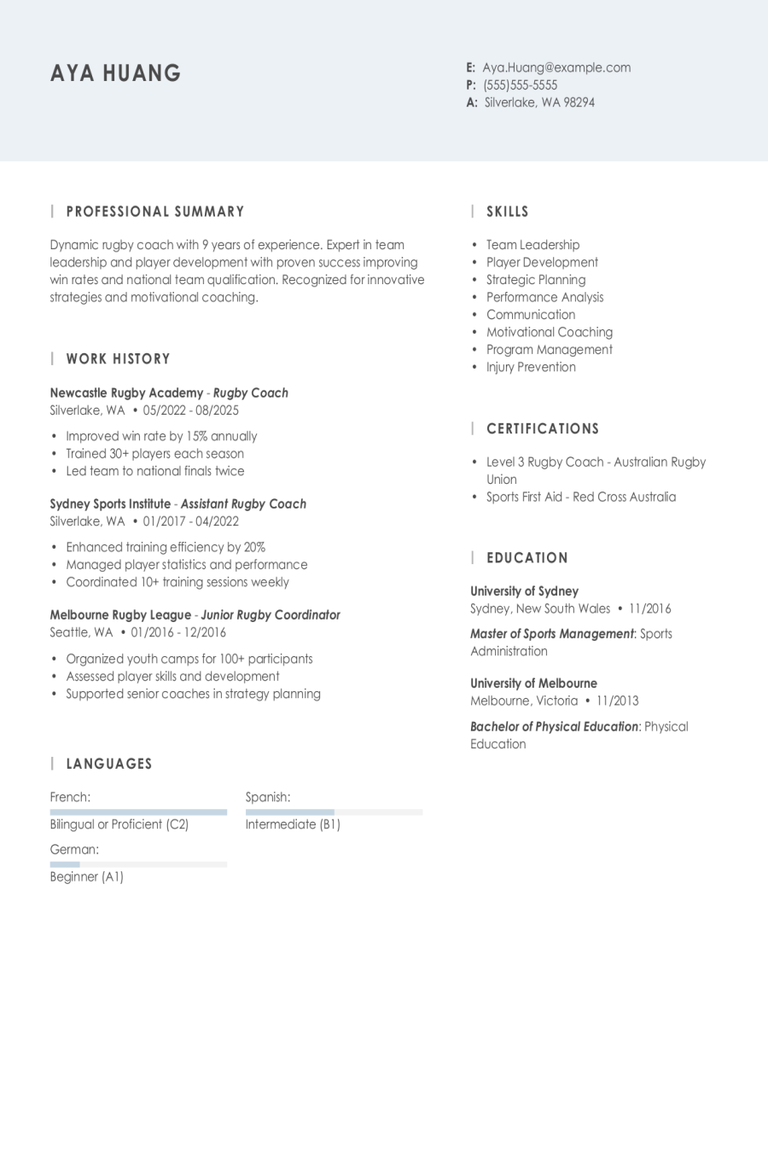
Rugby Coach Resume Examples & Templates
Discover rugby coach resume examples and tips that will help you highlight your coaching experience and player development skills.Build my resumeImport existing resumeCustomize this templateWhy this resume worksQuantifies accomplishments: By improving
